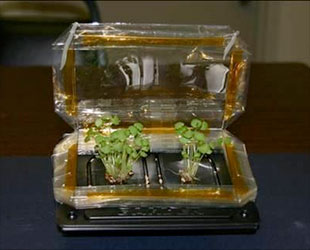January 19, 2007 — When educator-astronaut Barbara Morgan launches to the space station this June, she hopes to 'plant the seed' that will start students thinking about their own futures in space.
Literally.
In addition to Morgan and her six STS-118 crew mates, space shuttle Endeavour will have on-board millions of basil seeds, which will be distributed after the mission to children in kindergarten through high school working to develop their own designs for Moon- or Mars-based plant growth chambers.
"We know they will be excited about having the seeds, something physical that has been in space that they can touch and grow," Morgan told collectSPACE during an educational event held Friday at Space Center Houston.
"There's a little bit of a metaphor there, its really planting the seed to get them going, it's getting something physical in their hand that they can go and do what we do — explore, experiment and discover," explained Morgan.
The flown basil seeds will be used by students to test their own designs for growing plants and food on other planets. Morgan will formally announce the "engineering design challenge" while in space but is sharing the basic details now so that teachers can incorporate the project into their fall lesson plans.
Morgan wants to involve students in real space activities to teach them how the can play a part in their own future.
"We want them to understand that our mission, and all these series of missions, are just one and long step into an open ended future. So we're going to help finish building the International Space Station, that leads on to us going to the Moon and on to Mars. Right now, as you know, we are working on the exploration vehicle and how we are going to get to the Moon and how we are going to get to Mars," continued Morgan. "[For] these kids... and even high school seniors today, that will be figured out by the time they are in graduate school but there's lots and lots of stuff that hasn't been figured out at all yet."
"We want to get them engaged now figuring out that stuff so they can actively contribute to advancement now and not just by absorbing knowledge from us but by working within and working together on these problems that haven't been solved," Morgan described as her motivation behind the plant growth chamber challenge.
Students participating will be able to compare the basil they grow on Earth with seeds planted on-board the ISS.
"We are also taking up a growth chamber that we will be transferring over to station and Clay [Anderson, STS-118 crewmember and station resident,] will start and continue the growth of these basil seeds," Morgan said.

Basil plants grown from seeds on Earth in a simple plant growth chamber. Students will design similar plant growth chambers for basil seeds flown aboard STS-118. (NASA) |
In addition to the seeds, NASA is planning for Morgan and perhaps her crewmates to participate in as many as three educational "downlinks" when she will answer students questions from aboard the shuttle and station.
"Right now we are still negotiating that with the mission operation folks to find out how much time we have and what type of activities we can do," said Robert Musgrove, deputy director of the education office at NASA Johnson Space Center in Texas.
Beyond her educational duties, Morgan will help operate the shuttle's robotic arm during the planned 11-day flight that will deliver and install a new station truss segment, bring supplies and will replace a U.S. crewmember living on-board the orbiting laboratory. Named a member of the 1998 NASA astronaut selection group, Morgan left her career as an Idaho teacher and has trained as a full-time astronaut since.
Morgan previously was selected as back-up to America's first teacher in space candidate, Christa McAuliffe, who was tragically killed along with her Challenger crewmates 21 years ago on January 28, 1986. Despite the accident, Morgan remained committed to flying in space. STS-118 will be her first mission.
Morgan knows that McAuliffe's memory will be forefront during the flight.
"I can't imagine that people aren't going to be thinking of her, thinking of Christa, and not just her but the whole Challenger crew. They will be there with us," said Morgan.
